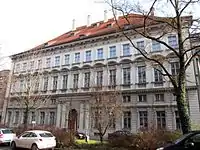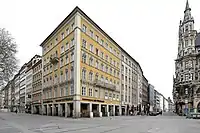
François de Cuvilliés the Younger (24 October 1731 – 10 January 1777) was a German architect, engraver, draftsman, engineer, and author.[1] He was the son of François de Cuvilliés (the Elder).
Biography
He was born in Munich on 24 October 1731.[1] Cuvilliés the Younger was trained by his father and later studied at the Académie royale d'architecture in Paris. In 1757 he got a job at the electoral court in Munich, around 1765 he was promoted to Captain of Engineers.[2] He was in the service of his father until, after his death in 1768, he became second chief master builder behind Karl Albert von Lespilliez. His works lead from late Rococo to early Classicism, following the October 1770 mandate of Maximilian III Joseph, Elector of Bavaria, whereby he practically forbade Rococo as a "ridiculous" ornament for country churches and called for a "noble simplicity".[3]
Cuvilliés the Younger continued to publish ornamental prints based on the works of his father.[4] His incomplete textbook Vitruve bavarois, named after a textbook by the Roman architect Vitruvius, was a model for various artists of different disciplines.
Works
- 1769: Alte Hauptwache at Marienplatz (Thomass-Eck) in Munich
- 1771–1777: Pfarrkirche Zell an der Pram
- 1771–1780: Abbey church of Kloster Asbach
- 1774: Neues Landschaftsgebäude in Munich
Gallery



 Inscription Plate in Scroll Ornament, ink over red chalk on blue paper, c. 1768, Museum Kunstpalast
Inscription Plate in Scroll Ornament, ink over red chalk on blue paper, c. 1768, Museum Kunstpalast Scroll Ornament, watercolor over red chalk, 1768, Museum Kunstpalast
Scroll Ornament, watercolor over red chalk, 1768, Museum Kunstpalast_(Sammelwerk%252C_2._Reihe)_MET_MM4975.jpg.webp) Morceaux de Caprice, engraving, 1745–56, Metropolitan Museum of Art
Morceaux de Caprice, engraving, 1745–56, Metropolitan Museum of Art_(Sammelwerk%252C_2._Reihe)_MET_MM7841.jpg.webp) Morceaux de Caprice, engraving, 1745–56, Metropolitan Museum of Art
Morceaux de Caprice, engraving, 1745–56, Metropolitan Museum of Art_MET_204798.jpg.webp) Pair of tripod candlestands, c. 1740, Metropolitan Museum of Art
Pair of tripod candlestands, c. 1740, Metropolitan Museum of Art
Further reading
- Dietmar Hundt, Elisabeth Ettelt: François de Cuvilliés d. Ä., François de Cuvilliés d. J. (Kleine Pannonia-Reihe; Bd. 139). Pannonia-Verlag, Freilassing 1990, ISBN 3-7897-0139-4.
- Andrea Rueth: François de Cuvilliés d. J. In: Jürgen Wurst, Alexander Langheiter (Hrsg.): „Monachia“ von Carl Theodor von Piloty. Städtische Galerie im Lenbachhaus, München 2005. S. 106–107. ISBN 3-88645-156-9.
- Johannes Schnell: François de Cuvilliés’ Schule Bayerischer Architektur. Ein Beitrag zum Stichwerk und zur Architekturtheorie beider Cuvilliés. Dissertation, Universität München 1961.
- Gerhard Woeckel (1957), "Cuvilliés, François der Jüngere Joseph Ludwig de", Neue Deutsche Biographie (in German), vol. 3, Berlin: Duncker & Humblot, pp. 453–454; (full text online)
References
- 1 2 "François de Cuvilliés (II)". RKD. Retrieved 9 November 2021.
- ↑ Karl Emich Leiningen-Westerburg (Count of.) (1901). German Book-plates An Illustrated Handbook of German & Austrian Exlibris. George Bell & Sons. p. 220. Retrieved 9 November 2021.
- ↑ "Baroke Bauwerke". www.sueddeutscher-barock.ch. Retrieved 9 November 2021.
- ↑ Hinchman, Mark; Yoneda, Elyssa (2018). Interior Design Masters. Taylor & Francis. ISBN 9781351685276. Retrieved 9 November 2021.
External links
 Media related to François de Cuvilliés the Younger at Wikimedia Commons
Media related to François de Cuvilliés the Younger at Wikimedia Commons